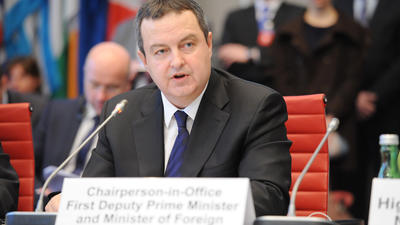-
Our work
-
Fields of work
- Arms control
- Border management
- Combating trafficking in human beings
- Conflict prevention and resolution
- Countering terrorism
- Cyber/ICT Security
- Democratization
- Economic activities
- Education
- Elections
- Environmental activities
- Gender equality
- Good governance
- Human rights
- Media freedom and development
- Migration
- National minority issues
- Policing
- Reform and co-operation in the security sector
- Roma and Sinti
- Rule of law
- Tolerance and non-discrimination
- Youth
- Field operations
- Projects
-
Meetings and conferences
- Summit meetings
- Review Conferences
- Ministerial Council meetings
- Plenary meetings of the Permanent Council
- Plenary Meetings of the Forum for Security Co-operation
- Security Review Conferences
- Annual Implementation Assessment Meetings
- Economic and Environmental Forum
- Economic and Environmental Dimension Implementation Meetings
- Human rights meetings
- Media conferences
- Cyber/ICT security conferences
- Conference of the Alliance against Trafficking in Persons
- Gender equality conferences
- Annual OSCE Mediterranean conferences
- Annual OSCE Asian conferences
- Partnerships
-
Fields of work
-
Countries
- All
-
Participating States
- Albania
- Andorra
- Armenia
- Austria
- Azerbaijan
- Belgium
- Belarus
- Bosnia and Herzegovina
- Bulgaria
- Canada
- Croatia
- Cyprus
- Czechia
- Denmark
- Estonia
- Finland
- France
- Georgia
- Germany
- Greece
- Holy See
- Hungary
- Iceland
- Ireland
- Italy
- Kazakhstan
- Kyrgyzstan
- Latvia
- Liechtenstein
- Lithuania
- Luxembourg
- Malta
- Moldova
- Monaco
- Mongolia
- Montenegro
- The Netherlands
- North Macedonia
- Norway
- Poland
- Portugal
- Romania
- Russian Federation
- San Marino
- Serbia
- Slovakia
- Slovenia
- Spain
- Sweden
- Switzerland – OSCE Chairpersonship 2026
- Tajikistan
- Türkiye
- Turkmenistan
- Ukraine
- United Kingdom
- United States of America
- Uzbekistan
- Asian Partners for Co-operation
- Mediterranean Partners for Co-operation
-
Structures and institutions
- Chairpersonship
-
Secretariat
- Secretary General
- Office of the Secretary General
- Conflict Prevention Centre
- Transnational Threats Department
- Office of the Special Representative and Co-ordinator for Combating Trafficking in Human Beings
- Office of the Co-ordinator of OSCE Economic and Environmental Activities
- Gender Issues Programme
- Opportunities for Youth
- Department of Human Resources
- Department of Management and Finance
- Office of Internal Oversight
- Documentation Centre in Prague
- Institutions
- Field operations
- Parliamentary Assembly
- Court of Conciliation and Arbitration
- Organizational structure
- About us
Story
OEBS i UN: Zajednički napori za bezbednost
- Datum:
- Izvor:
- OSCE Chairpersonship
- Fields of work:
- Sprečavanje i rešavanje konflikta
Predsedavajući OEBS-u, prvi potpredsednik Vlade Srbije i ministar spoljnih poslova Ivica Dačić poručio je na sastanku Saveta bezbednosti Ujedinjenih nacija (UN) 24. februara 2015. da OEBS želi da intenzivira partnerstvo sa UN. „Partnerstvo ove dve organizacije je ključno za rešavanje bezbednosnih izazova na evroatlantskom i evroazijskom prostoru“, rekao je Dačić.
Pominjući situaciji u Ukrajini (stranica dostupna samo na engleskom jeziku) i njenom štetnom uticaju na širu agendu OEBS-a Dačić je izjavio da se predsedavanje Srbije odvija u uslovima najveće krize evropske bezbednosti od kraja hladnog rata. „Srbija se angažuje u nastojanju da se pronađe diplomatsko rešenje na nepristrasan i transparentan način.“ >> Pročitajte ceo govor ovde.
Prevod Instagram posta: "U godini kada obeležavamo sedamdesetu godišnjicu Povelje UN i četrdesetu godišnjicu OEBS-ovog Helšinskog finalnog akta, ove dve organizacije nastaviće blisko da sarađuju, generalni sekretar Ban Ki-mun rekao je juče tokom sastanka sa predsedavajućim OEBS-u, ministrom spoljnih poslova Srbije Ivicom Dačićem i generalnim sekretarom Lambertom Zanijerom."
Puna podrška Ujedinjenih nacija
Članovi Saveta bezbednosti ponudili su punu podršku predsedavanju Srbije OEBS-u i njihovim prioritetima, naglasivši značaj OEBS-a u internacionalnoj areni, a pogotovo njenu ulogu i angažovanje u rešavanju krize u Ukrajini.
Tokom sastanka predsedavajući OEBS-u Dačić, generalni sekretar UN Ban Ki-mun i generalni sekretar OEBS-a Lamerto Zanijer diskutovali su i o saradnji OEBS-a i UN-a, situaciji u i u okolini Ukrajine i ulozi OEBS-a u suočavanju sa krizom. >>Pročitajte vest ovde
Mirno razrešenje sukoba zavisi od Paketa mera iz MInska
Generalni sekretar Ban i predsedavajući Dačić naglasili su da je mirno razrešenje konflikta u Ukrajini jedini put napred i on zavisi od pune primene Paketa mera iz Minska od 12. februara od strane svih.
Takođe su naglasili da prisustva OEBS-a i UN-a u Ukrajini treba da istraže nove načine za jačanje saradnje, posebno u oblasti humanitarnih pitanja i ljudskih prava.
„Specijalna posmatračka misija u Ukrajini (SPM) i Posmatračka misija na ruskim kontrolnim punktovima Gukovo i Donjeck predstavljaju najočigledniji primer osposobljenosti OEBS-a da pokrene zajedničke akcije čak i za vreme krize. Oni nastavljaju da pružaju objektivno izveštavanje i podatke sa terena konflikta uprkos mnogim izazovima,“ rekao je Dačić.
OSCE Impact
Discover more stories about how the OSCE improves lives.

